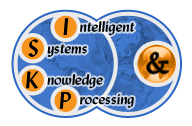DR-DEVICE is a system for defeasible reasoning on the Semantic Web.
Defeasible reasoning is a rule-based approach for efficient reasoning with incomplete and inconsistent information. Such reasoning is, among others, useful for ontology integration, where conflicting information arises naturally; and for the modeling of business rules and policies, where rules with exceptions are often used. It can represent facts, rules, and priorities among rules. This reasoning family comprises defeasible logics and Courteous Logic Programs. The main advantage of this approach is the combination of two desirable features: enhanced representational capabilities allowing one to reason with incomplete and contradictory information, coupled with low computational complexity compared to mainstream nonmonotonic reasoning.
DR-DEVICE is capable of reasoning about RDF metadata over multiple Web sources using defeasible logic rules. The system is implemented on top of CLIPS production rule system and builds upon R-DEVICE, an earlier deductive rule system over RDF metadata that also supports derived attribute and aggregate attribute rules. Rules can be expressed either in a native CLIPS-like language, or in an extension of the OO-RuleML syntax. The operational semantics of defeasible logic are implemented through compilation into the generic rule language of R-DEVICE.
The most important features of DR-DEVICE are the following:
- Support for multiple rule types of defeasible logic, such as strict rules, defeasible rules, and defeaters.
- Support for both classical (strong) negation and negation-as-failure.
- Support for conflicting literals, i.e. derived objects that exclude each other.
- Direct import from the Web of RDF ontologies and data as input facts to the defeasible logic program.
- Direct import from the Web of defeasible logic programs in an XML compliant rule syntax (RuleML).
- Direct export to the Web of the results (conclusions) of the logic program as an RDF document.
